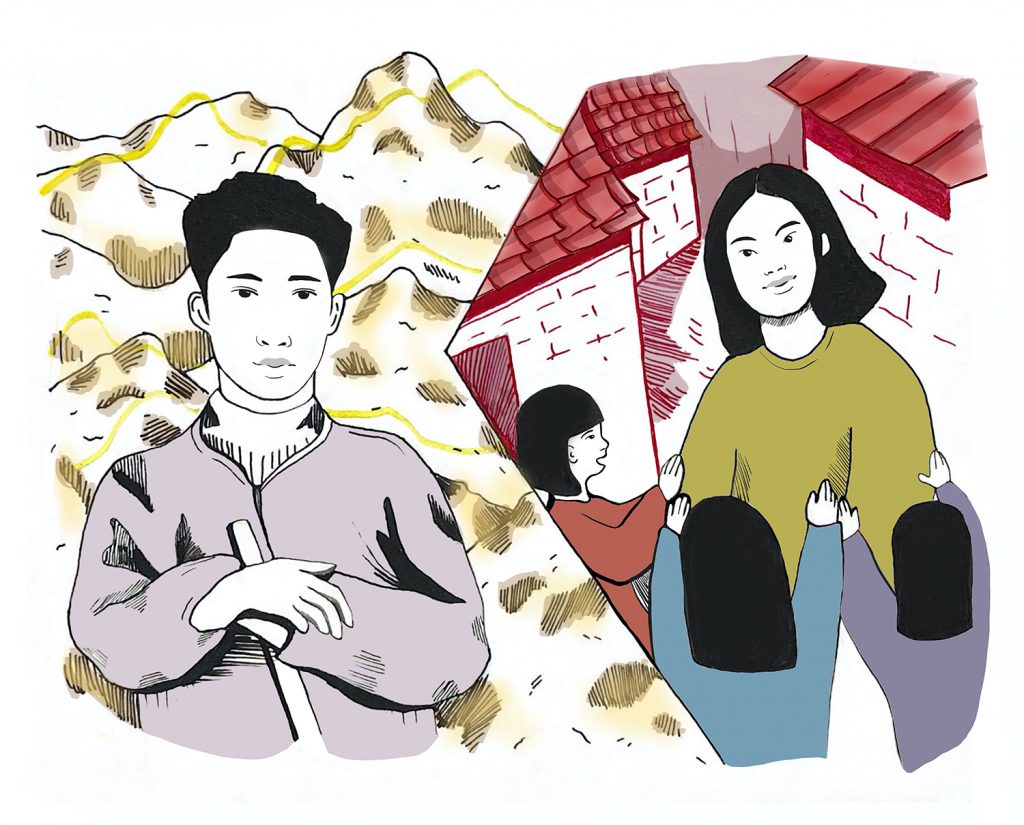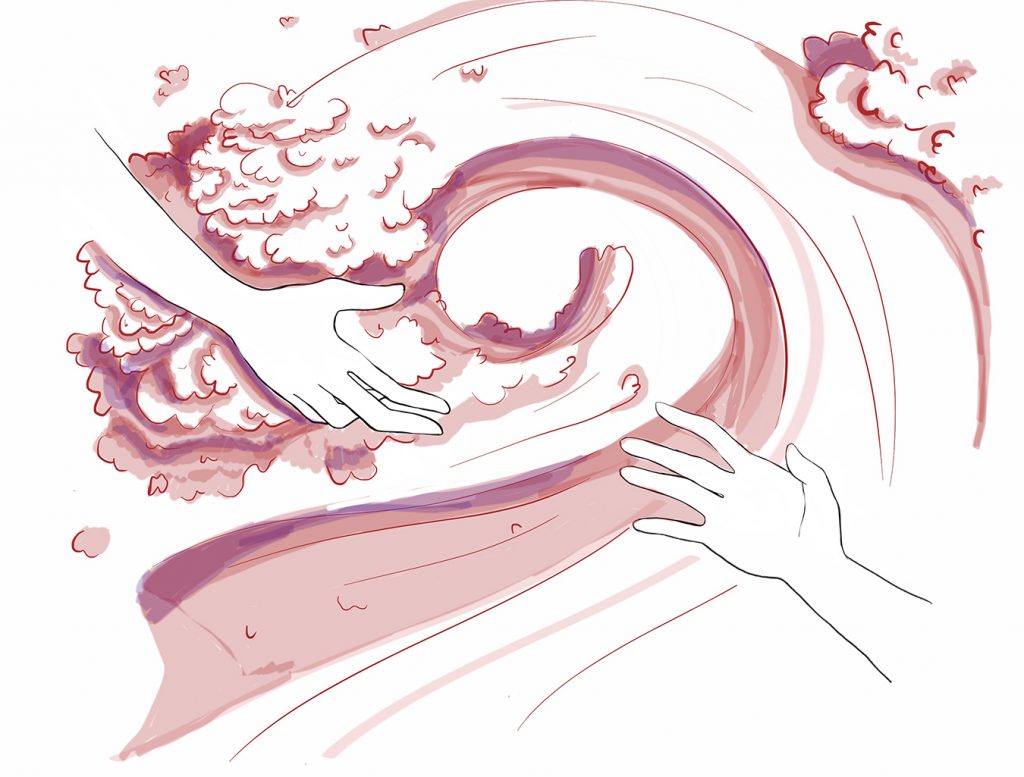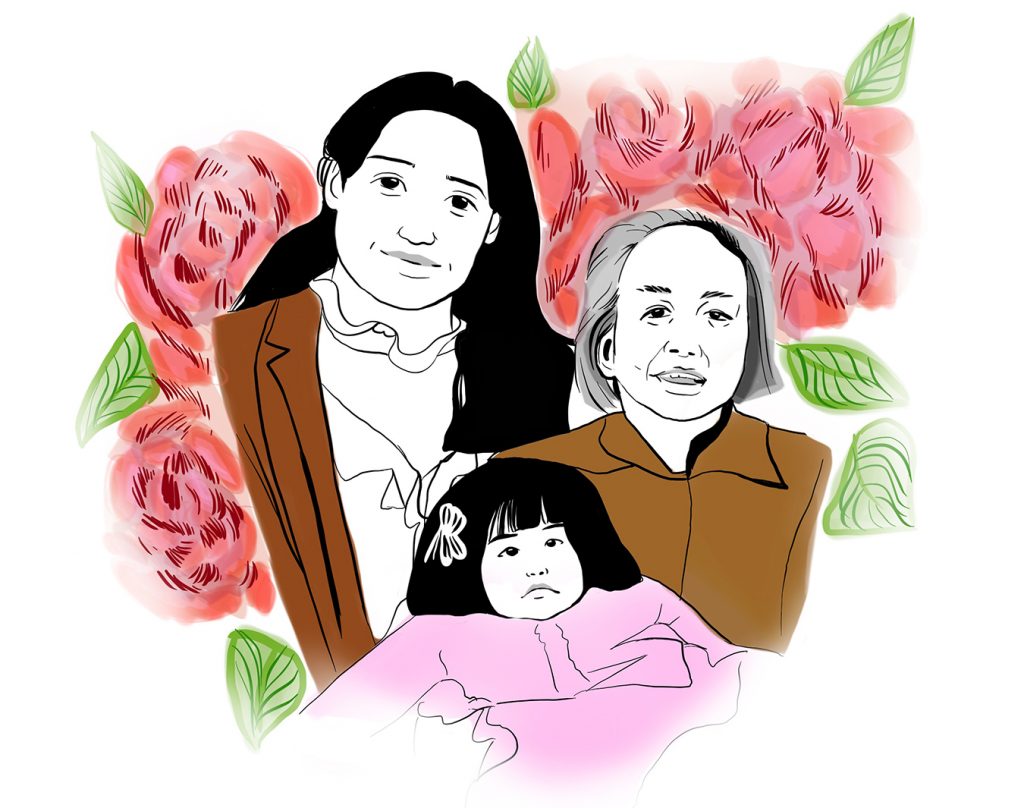Generations
Lailan Sandra Huen | llustrations by Kathy Liang

To Generate:
- to bring into existence
- to originate by a vital, chemical, or physical process
- to be the cause of a situation, action, or state of mind
Generation:
- a type or class of objects usually developed from an earlier type
- a body of living beings constituting a single step in the line of descent from an ancestor

Poh Poh | Mother of My Mom
Born May Wong, my Poh Poh grew up in Hoi Ping province, a rural village in the South of China to the west of the Pearl Delta. Her father and grandfather were herbalists, and her father came to the United States as a merchant around the early 1900s to open an herbal shop in SF Chinatown, likely soon after my grandmother was born. While laborers were banned during the federal Chinese Exclusion Act, merchants were allowed to immigrate – but it was much harder for women to come.
So while the men made the journey to Gold Mountain to make money for the family with the goal of bringing back wealth to the village in China, the women took care of the children and raised the family by themselves in the village under a time of great poverty. They also took care of mother-in-laws who had also been abandoned. Poh poh didn’t bind her feet, so she worked the farm to feed the family.
George Quan, a Chinese American immigrant living and working in Oakland, California in the early 1900s came back to China to wed Poh Poh and quickly had a baby in 1928 before he left and spent the most of almost 20 years apart from my grandmother, working in Oakland Chinatown while she raised her eldest daughter and adopted a son.
Only after serving in the U.S. Army as a cook was he able to bring May to California through the War Brides Act after 1946. Still under the Chinese Exclusion Act, she was detained and interrogated for two months on Sansome Street in San Francisco. Immigration officials assumed many Chinese women were coming as prostitutes, and faced humiliating interrogation. She was forced to leave her eldest daughter in China, but brought my Uncle Tai, and birthed my Mom in 1949 in Livermore where the family opened the first Chinese restaurant in town.
I can only imagine the loneliness my poh poh and grandpa felt for the two decades they lived apart. So many families were broken apart during this period by racist immigration policies, children raised without fathers, and daughters and mothers working together to keep families together while the men went to distant shores for work.
Poh poh and Dai Yi, my mother’s older sister, were very close, and poh poh was heartbroken to be so far from her daughter after living together for so long in China. When my Mom was 5 years old, grandpa died in 1954, leaving poh poh alone again to raise the children, with less than 10 years together with her husband, half the time they were apart.

Mah Mah | Mom
Mom was one of only a few Asian kids at school, and one of only a small number of kids of color in Livermore. In a small town, everyone knew that her father had died and that her family was very poor, so they were kind. Mom spent most of her time in the public library, worked hard in school, and received a scholarship to attend UC Berkeley in the late 1960s. She helped found Asian American Studies and taught the first Asian American Women class and edited the Asian Women Journal.
When Mom was posting flyers in support of the Grape Strike, the administration called Poh Poh in to threaten her scholarship if she persisted in her political activities. Mom was furious that her immigrant mother had been dragged into that UC Berkeley office to be scolded, and continued her organizing.
Mom came of age during the most radical era of United States politics and culture, blossoming as a fierce woman organizer in the 1970s when she became the first Asian health advocate in New York City, then the first immigrant woman organizer for SEIU in California. She went on to become the first Asian woman of many things, holding together being a mother while being a public servant and dedicating her life to social change. Watching her strength, her intelligence in action, her commitment to causes and campaigns, her putting career as a priority, taught me that women should be respected as equal partners and leaders.

Mui Mui | Little Sister
I always wished I had an older sister. But instead, I was teased by my older brother, and felt so alone in a nuclear family household as my father worked late nights at hospitals and attended evening meetings and my Mom worked late nights as a union organizer and later as an elected official in public service. Only years later did I reflect on how my mother’s childhood must have been difficult, unable to speak in her mother’s language and without a father, and how that shaped her own actions as a mother. I reached back to think about my grandmother, and thought about how the pain of her isolation and immigration could have been passed down through me, in my poh poh’s body passed through my mother’s body to me.
I think about how in my family, especially amongst the women, we don’t say
“I love you” to express our love. We show it through actions, through survival, through helping to give each other strength. I think about how this lineage of loneliness shape my relationships, my friendships, my deep desire to build community but also my independence and solitude. Asian American women are the strongest people I know. They are my fierce mentors, my guardian angels, my healers, my role models of fearless leadership and love. They are defenders of justice and righteousness. They are the bridges who stretch across the gaping holes of insufficient social infrastructure, racist policies, invisibility. They birth new concepts, forging paths outside of the boxes created for us. They do not take any bullshit. They fight for our future and the coming generations.
LAILAN SANDRA HUEN is a community organizer working to build people power through leadership development, civic engagement, and grassroots coalition-building who was born and raised in Oakland in a Chinese American family in the Bay Area since the Gold Rush. She works in the Oakland Unified School District’s Office of Equity to support Asian and Pacific Islander students.
KATHY LIANG is a 2020 graduate of Oakland Technical High School’s Fashion Arts & Design Academy. She was born and raised in Oakland in 2002 while her mother came to the United States for refuge from Laos and her father immigrated from China. She explores ways to use traditional media (painting and drawing) and graphic design to advocate for her community. Her involvement includes combating teen dating and domestic violence in API Legal Outreach and supporting Southeast Asian young women in Banteay Srei.